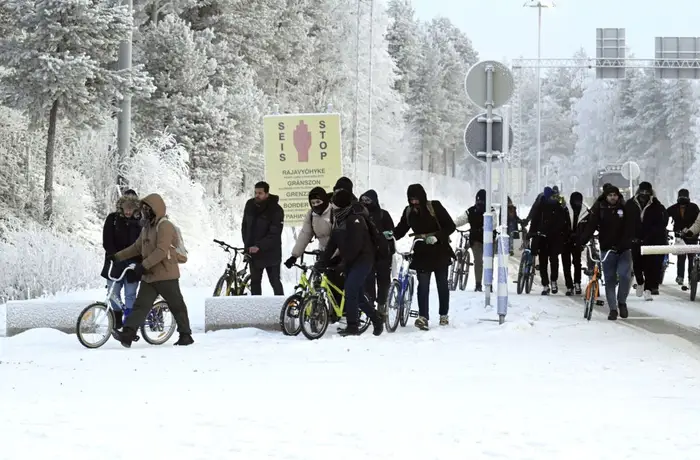Russia Accused of Fomenting Migrant Crisis on Finnish Border: NATO's Newest Member Under Pressure
In a recent development, Finland has accused Russia of deliberately provoking a migrant crisis on its border, a move seen as an attempt to destabilize NATO's newest member. This accusation comes from Mikko Kinnunen, an ambassador at Finland's Ministry for Foreign Affairs, as reported by Newsweek

In a recent development, Finland has accused Russia of deliberately provoking a migrant crisis on its border, a move seen as an attempt to destabilize NATO's newest member. This accusation comes from Mikko Kinnunen, an ambassador at Finland's Ministry for Foreign Affairs, as reported by Newsweek on November 23, 2023.
Finland has observed a significant increase in asylum seekers at its border with Russia, prompting the closure of four out of eight road border crossings. Helsinki suspects this surge is a strategic maneuver by Moscow to exert pressure, a claim that Russia denies. The only remaining open border crossing is at Raja-Jooseppi in northern Finland.
This situation echoes a similar strategy allegedly employed by Russia and Belarus on the Polish border in 2021. The Institute for the Study of War (ISW) in Washington D.C. describes this as a “hybrid warfare tactic” aimed at destabilizing NATO. Previously, Belarusian security forces were accused of assisting Middle Eastern migrants in crossing into Poland, leading to tensions between NATO and Belarus.
Finland's decision to join NATO as its 31st member in April was largely influenced by the ongoing conflict in Ukraine and perceived threats from Russia. Russia's extensive 830-mile border with Finland and historical context add to the complexity of the current situation. Moscow's displeasure over NATO's expansion has been a longstanding issue, often cited by President Vladimir Putin.
Ambassador Kinnunen points out that this tactic of "instrumentalizing people" from various regions as migrants at the border is not new. Similar incidents occurred in 2015 and 2016, causing uncertainty in Finland, then a non-NATO country.
The Finnish response to the crisis includes adherence to international treaties and EU laws regarding asylum seekers, even as they fortify their borders with barriers and barbed wire. This action reflects Helsinki's commitment to balancing national security concerns with humanitarian obligations.
Meanwhile, the Russian Ministry of Foreign Affairs, through spokesperson Maria Zakharova, has expressed readiness to negotiate with Helsinki regarding the border issue.
This development in Finland is part of a broader pattern of geopolitical tensions involving NATO countries. A parallel situation is unfolding at the Polish-Ukrainian border, where Polish truck drivers have initiated a blockade over economic concerns, further complicating the regional stability in Eastern Europe.
The unfolding events at the Finnish border underscore the intricate dynamics of international relations, where migration, national security, and geopolitical strategies intersect. The situation remains tense as Finland navigates these challenges as a new member of NATO, while maintaining its obligations under international law.




